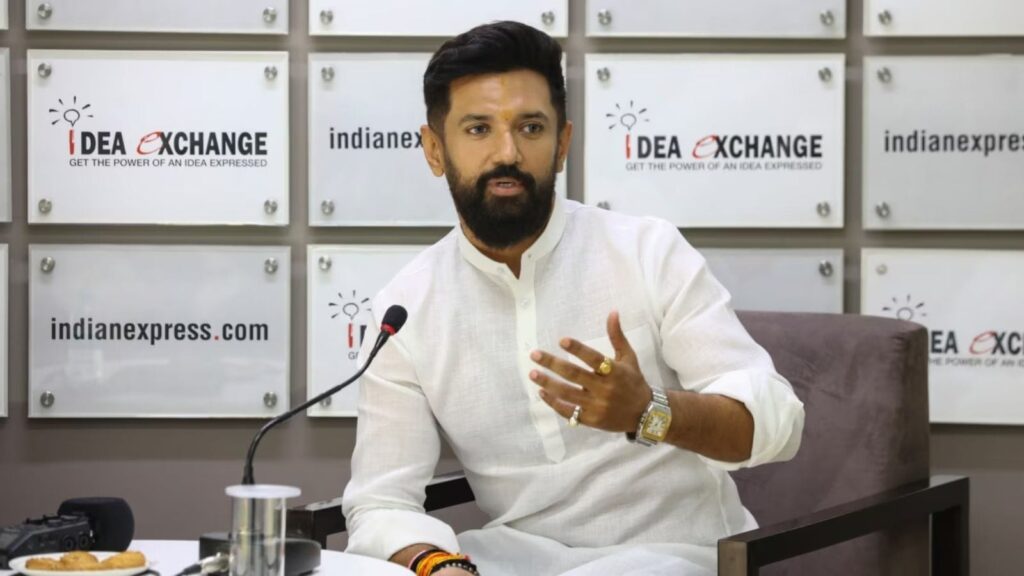As the NDA on Sunday announced its seat-sharing formula for the coming Bihar Assembly elections, the eyecatcher with 29 seats was Chirag Paswan’s Lok Janshakti Party (Ram Vilas).
Admitting that Chirag had punched well above his weight and that the BJP accommodated him to keep the alliance “united and healthy”, sources said the party’s decision was informed by its “weak footing among the Dalits”.
Here are the factors that played a role in the BJP giving in to Chirag’s demands.
The Dalit scare
Attributing the party’s poor performance in the 2024 Lok Sabha elections in Uttar Pradesh to a “sizeable chunk of Dalit votes going towards the Samajwadi Party (SP)”, a senior BJP leader said, “The BJP could not capitalise on the vacuum created by the decline of the Bahujan Samaj Party (BSP), and the controversy over the Constitution (that a big-majority BJP government may alter the reservation structure) ahead of the polls did not help us either. We did better in Bihar (as compared to UP) but our tally was lower than in 2019. Now, controversies surrounding the shoe hurled at Chief Justice of India B R Gavai and the alleged suicide of Dalit IPS officer Y Puran Kumar in Haryana are weighing on the alliance’s mind ahead of the Bihar polls,” the leader added.
Sources said that to accommodate Chirag’s uncompromising stand, the BJP finalised the formula of allocating seats to smaller allies based on the number of Lok Sabha seats they contested and won last year. According to this formula, Upendra Kushwaha’s Rashtriya Lok Morcha (RLM) and Jitan Ram Manjhi’s Hindustani Awam Morcha (Secular) were given six seats each, while the LJP (RV), which had won all five of the seats it contested, was given one short of 30.
Pressure tactics
Another BJP leader said the LJP (RV) did not “deserve more than 20 seats”. “This was the original formula, over which there was broad understanding among alliance partners — except Chirag. The seat-sharing deal remained in limbo for a long time as Chirag stuck to his unjustified demand of 40 seats. Upon the directions of the BJP leadership in Delhi, which did not want to lose more time, the LJP (RV) finally settled on 29 seats,” the leader added.
Sources said Chirag deftly exploited the BJP’s vulnerability in Bihar, especially in the light of its diminished Lok Sabha tally compared to the 2019 polls.
Aiming for a larger share of the pie, the LJP (RV) chief had begun setting the stage since May when he announced his intention to return to Bihar politics. He followed the announcement with occasional potshots at the Nitish Kumar government, slamming it over law-and-order issues.
During a visit to Gaya in July following a spate of crimes in the state, Chirag expressed “deep anguish at the poor law-and-order situation in Bihar”, saying he felt sad about supporting a government under which crime had “spiralled out of control”.
Chirag’s attacks were almost immediately followed up by LJP (RV) MP and his brother-in-law Arun Bharti, who counted Nitish among leaders “who had grown old”, and suggested that the state needed a young leader to take Bahujan politics forward.
With the attacks triggering unease among NDA partners, the JD(U) is learnt to have registered its strong protest with the BJP leadership in Delhi, which asked Chirag to “tone down” his criticism of the Nitish government.
“These were the pressure tactics used to get more seats, and Chirag has succeeded. Though he has expressed his desire to return to state politics, he is not really contesting the polls,” a senior JD(U) leader said.
Exploiting opportunity
For a leader staring at an uncertain political future only four years ago, the LJP (RV) securing 29 seats underlines Chirag’s political astuteness.
In 2021, after his uncle Pashupati Kumar Paras split the LJP, took the symbol and joined the NDA with four of the party’s six MPs, Chirag had found himself in political doldrums.
While Chirag squarely blamed Nitish and the JD(U) for the division in the LJP, political calculations at the time meant the BJP did not rush to his side.
“Though Chirag famously declared himself as Prime Minister Narendra Modi’s Hanuman, the BJP had to side with Paras owing to political compulsions. However, the party never shut its doors on him. Chirag’s Ashirwad Yatra in Bihar demonstrated that Dalit voters see him as the true heir to Ram Vilasji,” a senior Bihar BJP leader said.
In a bid to score over the BJP and gain more bargaining power against an emboldened ally, a few JD(U) leaders even tried to persuade Paras to join them. However, the BJP swung into action to ensure that Paras firmly backed it. A day after the LJP split on June 14, 2021, Paras’s claim of being the chief of the party’s Parliamentary Board was accepted by the Lok Sabha.
By April 2022, Chirag was virtually on the road after he was “forcibly” evicted from his father’s (former Union Minister Ram Vilas Paswan) Janpath bungalow following his demise.
Though he repeatedly told the media that he felt “cheated and humiliated” as images of his belongings — with a photo of Paswan senior atop them — piled up on the road and beamed across TV channels, Chirag reiterated his loyalty to Modi, exhibiting an ability to assess political winds, a quality his father possessed in plenty.
Chirag’s ability to attract massive crowds, and his assertion that the LJP belonged to him, did not go unnoticed by the BJP. Following Modi’s touching letter to Chirag on Paswan’s first death anniversary, the NDA’s doors reopened for him. He formally returned to the alliance in 2023.
Though the LJP (RV) chief continues to command over only about 5% of the votes — primarily of the Paswan community — his party’s 100% strike rate in the 2024 Lok Sabha polls and the 29 seats he has secured for the upcoming Assembly elections underline that Chirag has come of age as a politician.

